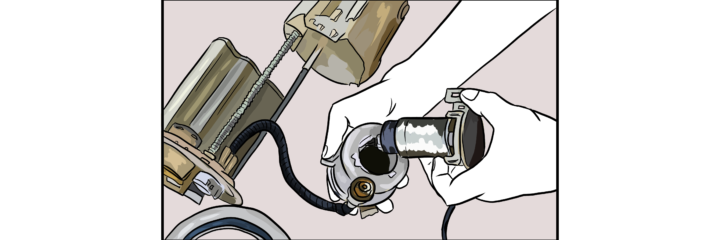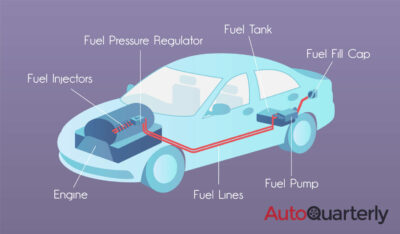The fuel pump in your car exists to help transport fuel from the storage tank to the engine – if it is faulty and in need of repair, your car may not be performing correctly, which can present a serious danger when driving. The symptoms of a bad fuel pump may be hard to pin down, but if you suspect that your car is having fuel pump issues, you should carefully check each symptom and look for the culprit of your vehicle’s problem.
In this article, we will be discussing the role of a fuel pump in your car and will be giving you some of the main symptoms that indicate the fuel pump is bad. We’ll also be helping you to understand when a fuel pump needs replacement and any associated repairs costs, so you can make an informed decision about your car.
What Is a Fuel Pump and How Does It Work?
All cars have fuel pumps that work to deliver the fuel from the storage tank up to the engine. As the fuel reaches the engine, it enters into the fuel injectors and is then sprayed into the engine’s cylinder combustion chamber or into the carburetor, depending on the vehicle type. This is what powers the car and allows it to accelerate. There are several different types of fuel pumps, the most notable of which are mechanical and electronic pumps, with electronic pumps being the most commonly used today. You can read more about the various types of fuel pumps here.
If your vehicle’s fuel pump is not working correctly, you will likely be experiencing problems accelerating or operating your car, issues with gas mileage, and trouble starting your car. These issues can range from annoying to dangerous, so it is important to figure out the cause of your vehicle’s problems before any kind of accident happens.
Symptoms of a Bad Fuel Pump
Below, we have listed the most common symptoms of a bad fuel pump. You may be experiencing one or more of these, so it’s important to evaluate each symptom to get to the bottom of your car’s problem.
Car Won’t Start
Difficulty starting or having your car completely refuse to start can be associated with a bad fuel pump. This is because there is less pressure in a faulty fuel pump, causing less fuel to make it to the engine and preventing it from working properly. It may take several tries for your vehicle to start, or your car may not start altogether.
This being said, there are a number of other issues that may cause you to have issues starting your car, so be sure to pay attention to any other symptoms you may be having in order to find the true culprit of your car’s problems.
Fuel Tank Noise
Any kind of loud whining or howling sound that is coming from your fuel tank is a good indication that your fuel pump is faulty. With a fuel tank that is working correctly, you should not be able to hear anything except for maybe a low hum.
Sputtering Engine
If you are driving at higher speeds and experience your engine sputtering or it being unable to keep a consistent speed, there may be issues with your fuel pump. This is because a faulty fuel pump will not be releasing gas at a consistent rate or with the right pressure, which causes the engine to receive varying amounts of power.
Engine Stalling
Engine stalling can be caused by not enough fuel reaching the combustion cylinders. If your vehicle isn’t receiving the fuel it needs to operate due to a bad fuel pump, it will stall out. This can be very dangerous and may cause an accident, so it is important to drive your car as little as possible if you are having issues with it stalling.
Loss of Power or Power Surges
Because a bad fuel pump is not able to properly regulate the amount of fuel the engine is receiving, your car may experience loss of power when accelerating or power surges that cause the car to lurch. You may also have a problem with losing power when your car is under stress, such as when it is hauling cargo or other heavy items; this can also happen when driving uphill or on an incline.
Acceleration Issues
Speed spikes can be caused by a bad fuel pump as it may send out too much fuel at once while you are driving. This can cause lurching of the car or a brief, uncontrollable acceleration. You may also experience issues where you need to accelerate, but the car refuses to go faster due to the lack of fuel being sent from the fuel pump. Both of these problems can be fairly dangerous, so if you are experiencing them, try not to drive your car as much as possible until the issue is fixed.
Decreased Fuel Milage
If your fuel pump is damaged, it will likely not be sending the right amount of fuel needed to power your car in any situation. This can result in lower fuel mileage as your car uses way more gas than necessary while you drive.
However, you should keep in mind that poor fuel mileage can be caused by other issues too, so you should check for additional symptoms to determine whether or not your fuel pump is faulty.
Engine Overheating
A bad fuel pump can send the incorrect amount of gas to the engine which may cause it to overheat as the engine works harder to try and stay functioning. An overheating engine may cause the check engine light to come on, or it may cause other more serious issues such as smoke or internal engine damage. You may also experience stalling when your car reaches higher temperatures as a result of the lack of fuel.
When Should You Replace a Fuel Pump?
For most car owners, a fuel pump is not something you will ever need to think about. It is not in the rotation of typical maintenance checks and typically only fails when a car has significant mileage put on it. Most fuel pumps today can last for over 100,000 miles before they start breaking down.
If you have an older car that has a high mileage on it and you are experiencing one or more of the symptoms we discussed, it is possible that you have a bad fuel pump. Depending on the cost of repair, some owners choose to purchase a new vehicle at this point instead of attempting to replace the fuel pump, but this is a very subjective decision.
Repair Costs for a Bad Fuel Pump
The repairs costs for a bad fuel pump can range from around $200 to over $1,000 depending on the type of vehicle you have and how old the vehicle is. Labor alone for the fuel pump will cost between $120 and $300, while the parts cost between $90 and $900 dollars. A local mechanic will likely have cheaper prices than if you visit a dealership to get your fuel pump evaluated and replaced.
Can You Replace a Fuel Pump at Home?
It is possible to replace your fuel pump at home, but this should only be done if you have a little bit of experience with home car maintenance and own the proper equipment. Because the fuel tank contains gas, there is a risk of fire when replacing the fuel pump; you will need to make sure that you have safety glasses, gloves, and a fire extinguisher on hand at all times during the replacement process. This article can help guide you through the steps of replacing a faulty fuel pump.
You should also be completely sure that your fuel pump is causing your car issues before you undertake this process. You can always consult with a professional to be sure before trying to replace the fuel pump, but if you aren’t confident with repairing it yourself, a professional mechanic would be happy to do that for you too.
Ensuring Your Car Stays Moving
Encountering issues with your vehicle’s fuel pump can be alarming and may bring your car – and life – to a halt. If you think that you are experiencing problems caused by a faulty fuel pump, check out our list of symptoms and carefully evaluate each one to narrow down the root cause of your car’s issue. Remember to consult with a professional mechanic if you believe you have a bad fuel pump, as they will be able to provide a complete diagnostic and make any recommendation repairs so that you can keep your car safely moving.



